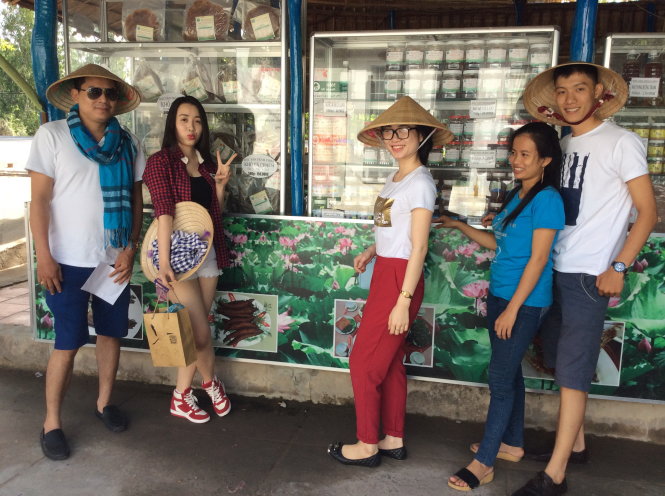A group of young people have enhanced the allure of a national wildlife reserve in a Mekong Delta province by selling a wide array of delectable, hygienically- ensured food specialties and souvenirs.
A team of Communist Youth Union members who reside in Tam Nong District, Dong Thap Province, have launched a start-up business by forming a cooperative, growing and raising their own trout and other breeds of fish, in addition to vegetables.
The group also purchases other items from local farmers to diversify their products.
They prepare the fish and vegetables into mouth-watering dried, salty fish and pickles, which are displayed for sale at a tourism product stall at Tram Chim National Park in Tam Nong.
A number of souvenirs, including mementoes featuring lotuses, the province’s tourism icon, red rice and dried lotus seeds, are also available for sale.
Tram Chim National Park, which spans several communes, is home to hundreds of thousands of individual birds from 233 waterfowl species, accounting for one-fourth of the country’s bird population.
Among them, many are rare species listed in Vietnamese and global red books of endangered fauna and flora.
The 7,300-hectare park boasts vast expanses of lush cajuput, which have long been a haven for such rare waterfowl species as white-winged wild ducks, spot-billed pelicans, lesser adjutant storks and red-headed cranes.
Nguyen Thi Mai, the shop assistant, cheerily presented the group’s “kho ca loc” (dried, salty trout) to tourists.
“The home-raised fish, which meets food safety standards, underwent five drying sessions, thus allowing lengthy preservation. We’ll give you a refund or change to other items if our products don’t meet your expectations,” she said.
Mai revealed their dried salty fish and pickles sell particularly well on weekends, when the park is packed with tourists.
Thirteen youths are currently involved in growing and processing “kieu” (a type of plant), while another 20 are in charge of producing dried salted fish and growing banana trees.
Previously, local youths sometimes sold the team’s home-grown products, but at dirt-cheap prices, according to Tran Van Tan, a group member.
Once, they gifted some to a group of doctors from Ho Chi Minh City, who offered free treatment to poor locals.
The doctors enjoyed the group’s products and wanted to buy more.
“The idea of producing more salted fish and pickles, buying other items from local farmers and selling them to tourists suddenly crossed my mind. That would augment our income and help local farmers offload their produce,” Tan divulged.
Nguyen Thanh Hieu, one of the cooperative’s founders, said they plan to grow red rice on a pilot basis, and try their hands at a new type of traditional wine.
“The group members earn a monthly average of VND1.2-2 million [US$55-92] from the business. They’re all excited at earning extra income and promoting their hometown’s specialties at the same time,” Hieu said.
The cooperative has also inked deals with local companies to add diversity to their shop.
Paper bags, instead of nylon bags, are used, creating an environmentally-friendly image among tourists.
Le Hoang Long, of the Tram Chim National Park, said the park management did not hesitate at all when they first struck a deal with the cooperative.
“With the group’s diverse, quality products and friendly service, the park’s specialty-souvenir shop now operates considerably more effectively than before. The shop has also received positive feedback from tourists,” Long added.
Like us on Facebook or follow us on Twitter to get the latest news about Vietnam!






















































